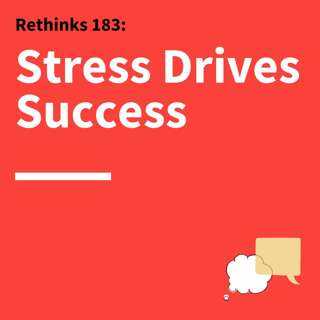
183. Rethinks: How Anxiety Can Fuel Better Communication
Reframe anxiety as a strength and use stress to enhance your communication.Stress, anxiety, nervousness — when these feelings inevitably arise, lecturer Kelly McGonigal says it’s not about making them go away, but using them to your advantage.“What I have come to value about anxiety,” says McGonigal, “is it’s a sign that I care.” As she explains, feelings of stress alert us to things that matter to us and help us stay present in the moment — particularly useful, she says, when it comes to communication.In this episode of Think Fast, Talk Smart, McGonigal and host Matt Abrahams discuss how to channel stress toward more effective communication and to a deeper connection to our own purpose and meaning.This episode is brought to you by Loom. Try Loom for free today at loom.com/thinkfast.Episode Reference Links:Kelly McGonigal Original Episode: Ep.69 Feeling Nervous? How Anxiety Can Fuel Better CommunicationEp.10 High-Stakes Communication: How to Manage Anxiety When Speaking in Front of OthersEp.33 Hacking your Speaking Anxiety: How Lessons from Neuroscience Can Help You Communicate Confidently. Connect:Premium Signup >>>> Think Fast Talk Smart PremiumEmail Questions & Feedback >>> hello@fastersmarter.ioEpisode Transcripts >>> Think Fast Talk Smart WebsiteNewsletter Signup + English Language Learning >>> FasterSmarter.ioThink Fast Talk Smart >>> LinkedIn, Instagram, YouTubeMatt Abrahams >>> LinkedInChapters:(00:00) - Introduction (02:47) - The Benefits of Anxiety in Communication (06:06) - Presence and Anxiety in Performance (07:46) - Common Communication Mistakes (11:45) - Encouraging Audience Engagement (14:49) - Crafting Effective Communication (16:46) - The Joy of Movement (19:54) - The Final Three Questions (27:45) - Conclusion *****Thank you to our sponsors. These partnerships support the ongoing production of the podcast, allowing us to bring it to you for free.Let Grammarly take the busywork off your plate so you can focus on high-impact work. Download Grammarly for free today Become a Faster Smarter Supporter by joining TFTS Premium.
4 Feb 29min
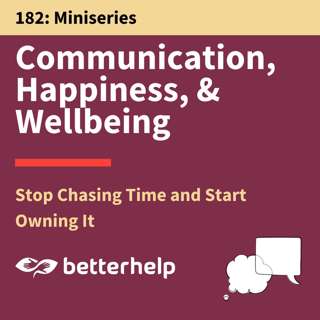
182. Stop Chasing Time and Start Owning It: Communication, Happiness & Wellbeing
Clarify your purpose — and stop wasting time.The new year gives us an opportunity to reflect on who we are and who we want to be. As we set resolutions and prepare for evolutions, this special four-part series on communication, happiness, and well-being explores practical ways to enhance our lives through better communication, deeper connections, and more meaningful choices.As Cassie Holmes knows, how we spend our time has a big impact on our happiness and well-being. For her, that means focusing on the things not just immediately in front of us, but those that most closely align with our purpose."When I say purpose, what I mean is what really drives you," explains Holmes, a professor at UCLA Anderson School of Management and author of Happier Hour: How to Beat Distraction, Expand Your Time, and Focus on What Matters Most. Living a happier and more fulfilled life, she says, rests on using purpose to drive our decisions. “Once you clarify for yourself: what is your purpose? What is your why? Then you can use that as a filter [for] where you should be spending your time.”In this episode of Think Fast, Talk Smart, Holmes and host Matt Abrahams explore practical strategies for being more purposeful with our time. From email management to relationship building, Holmes shares research-backed approaches for achieving greater happiness through intentional choices.This episode is sponsored by BetterHelp. Give online therapy a try at BetterHelp.com/ThinkFast and get ten percent off your first month.Episode Reference Links:Cassie HolmesCassie’s Book: Happier Hour: How to Beat Distraction, Expand Your Time, and Focus on What Matters Most Connect:Premium Signup >>>> Think Fast Talk Smart PremiumEmail Questions & Feedback >>> hello@fastersmarter.ioEpisode Transcripts >>> Think Fast Talk Smart WebsiteNewsletter Signup + English Language Learning >>> FasterSmarter.ioThink Fast Talk Smart >>> LinkedIn, Instagram, YouTubeMatt Abrahams >>> LinkedInChapters:(00:00) - Introduction (03:31) - Defining Purpose (05:54) - Time Management Strategies (08:26) - Time Tracking for Insight (12:49) - Consolidating Tasks (14:41) - Presence and Happiness (16:44) - The Final Three Questions (21:17) - Conclusion ********Become a Faster Smarter Supporter by joining TFTS Premium.Take advantage of our Sponsor offer from BetterHelp
30 Jan 21min
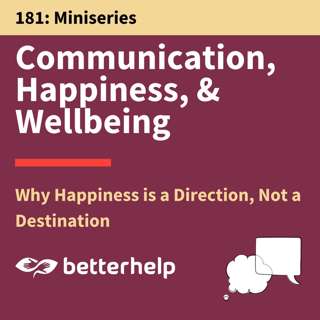
181. Why Happiness is a Direction, Not a Destination: Communication, Happiness & Wellbeing
Why connection is the key to a life well lived.The new year gives us an opportunity to reflect on who we are and who we want to be. As we set resolutions and prepare for evolutions, this special four-part series on communication, happiness, and well-being explores practical ways to enhance our lives through better communication, deeper connections, and more meaningful choices.When it comes to happiness, Arthur Brooks says it’s not about reaching a destination — it's about heading in the right direction. And according to him, that direction is fundamentally about relationships."Loving more people... more and more love... if you pursue that, you will defy the trends and get happier,” says Brooks, a social scientist, Harvard Business School professor, and author of several books including Build the Life You Want: The Art and Science of Getting Happier, cowritten with Oprah Winfrey. According to him, a happy life is made of enjoyment, satisfaction, and meaning, which we cultivate through connection with others. "Faith, family, friends, and work, that's your basic happiness 401k plan,” he says.In this episode of Think Fast, Talk Smart, Brooks and host Matt Abrahams explore the fundamental role of relationships in creating a happy life, and how effective communication helps us build and maintain these essential connections.This episode is sponsored by BetterHelp. Give online therapy a try at BetterHelp.com/ThinkFast and get ten percent off your first month.Episode Reference Links:Arthur Brooks Arthur’s Book: Build the Life You Want: The Art and Science of Getting Happier Connect:Premium Signup >>>> Think Fast Talk Smart PremiumEmail Questions & Feedback >>> hello@fastersmarter.ioEpisode Transcripts >>> Think Fast Talk Smart WebsiteNewsletter Signup + English Language Learning >>> FasterSmarter.ioThink Fast Talk Smart >>> LinkedIn, Instagram, YouTubeMatt Abrahams >>> LinkedInChapters:(00:00) - Introduction (02:27) - Defining Happiness (03:58) - The Macronutrients of Happiness (05:00) - Challenges in Pursuing Happiness (06:27) - Breaking Down Meaning in Life (08:11) - Happiness Across Life Stages (11:16) - Modern Happiness Challenges (14:29) - Mindfulness and Being Present (19:08) - The Final Three Questions (22:54) - Conclusion ********Become a Faster Smarter Supporter by joining TFTS Premium.Take advantage of our Sponsor offer from BetterHelp
28 Jan 24min
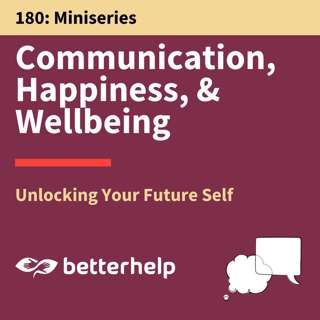
180. Unlocking Your Future Self: Communication, Happiness & Wellbeing
Why creating happiness in the future starts today.The new year gives us an opportunity to reflect on who we are and who we want to be. As we set resolutions and prepare for evolutions, this special four-part series on communication, happiness, and well-being explores practical ways to enhance our lives through better communication, deeper connections, and more meaningful choices.In pursuing happiness and well-being, we often focus on the present moment. But according to Hal Hershfield, one of the best ways to help ourselves today is to have a conversation with ourselves in the future."When I say future self, I really mean any version of us that exists at some later point in time," explains Hershfield, a UCLA professor and author of Your Future Self: How to Make Tomorrow Better Today. By thinking of our future selves as different people — ones we should care about — we can make better choices in the present. "If we can tap into the feelings of our future selves, then we can do more that benefits them, which may make our lives easier now and later."In this episode of Think Fast, Talk Smart, Hershfield and host Matt Abrahams explore how communication between our present and future selves can help us set goals, make decisions, and overcome pitfalls like procrastination, enabling us to take meaningful action now so we can thrive today and tomorrow.This episode is sponsored by BetterHelp. Give online therapy a try at BetterHelp.com/ThinkFast and get ten percent off your first month.Episode Reference Links:Hal Hershfield Hal’s Book: Your Future Self: How to Make Tomorrow Better TodayConnect:Premium Signup >>>> Think Fast Talk Smart PremiumEmail Questions & Feedback >>> hello@fastersmarter.ioEpisode Transcripts >>> Think Fast Talk Smart WebsiteNewsletter Signup + English Language Learning >>> FasterSmarter.ioThink Fast Talk Smart >>> LinkedIn, Instagram, YouTubeMatt Abrahams >>> LinkedInChapters:(00:00) - Introduction (02:12) - What Is a Future Self? (03:37) - Mistakes in Time Travel Thinking (04:45) - Overcoming Procrastination (07:16) - Connecting to Our Future Selves (10:35) - Disappointment and Adjusting Goals (12:14) - Goal Setting and Motivation (15:02) - Public Accountability for Motivation (16:04) - The Final Three Questions (20:35) - Conclusion ********Become a Faster Smarter Supporter by joining TFTS Premium.Take advantage of our Sponsor offer from BetterHelp
23 Jan 22min
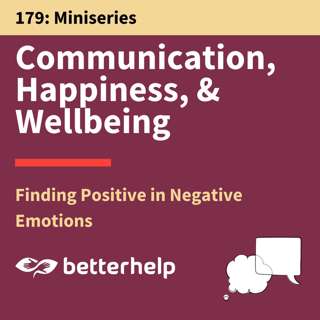
179. Finding Positive in Negative Emotions: Communication, Happiness & Wellbeing
A double definition of happiness — and how to cultivate both parts.The new year gives us an opportunity to reflect on who we are and who we want to be. As we set resolutions and prepare for evolutions, this special four-part series on communication, happiness, and well-being explores practical ways to enhance our lives through better communication, deeper connections, and more meaningful choices.There’s no one-size-fits-all approach to happiness, but according to Laurie Santos, everyone needs the two key components of contentment and fulfillment — or as she puts it, being happy in your life and happy with your life.“Being happy in your life [means] your life is filled with joy,” explains Santos, a Yale psychology professor and host of The Happiness Lab podcast. This felt sense of happiness — enjoying where we are, what we do, and who we’re with — is essential, but it’s not the only piece of the puzzle. Being happy with your life, she says, is the belief that “your life is going well. Being happy with your life gets closer to things like fulfillment and purpose.”In this episode of Think Fast, Talk Smart, Santos joins Matt Abrahams to explore how to cultivate both sides of her happiness equation, from building deeper connections with others to transforming the ways we communicate with ourselves.This episode is sponsored by BetterHelp. Give online therapy a try at BetterHelp.com/ThinkFast and get ten percent off your first month.Episode Reference Links: Laurie SantosThe Happiness Lab with Dr. Laurie Santos | Podcast Connect:Premium Signup >>>> Think Fast Talk Smart PremiumEmail Questions & Feedback >>> hello@fastersmarter.ioEpisode Transcripts >>> Think Fast Talk Smart WebsiteNewsletter Signup + English Language Learning >>> FasterSmarter.ioThink Fast Talk Smart >>> LinkedIn, Instagram, YouTubeMatt Abrahams >>> LinkedInChapters:(00:00) - Introduction (02:08) - Defining Happiness (03:21) - The Role of Negative Emotions (04:54) - Balancing Negative and Positive Emotions (05:45) - Positive Communication (07:18) - Improving Self-Talk (09:50) - Deepening Conversations (11:04) - Navigating Difficult Conversations (12:39) - The Power of Gratitude (15:15) - Technology and Wellbeing (18:33) - The Final Three Questions (22:35) - Conclusion ********Become a Faster Smarter Supporter by joining TFTS Premium.Take advantage of our Sponsor offer from BetterHelp
21 Jan 24min

178. Navigating Chaos and Uncertainty: The Power of Transparency and Empathy
Clear communication during times of uncertainty.Whether leading people through a 15-minute meeting or a years-long pandemic, communication requires compassion. For Dr. Anthony Fauci, that means being clear about who we’re speaking to and concise in what we say.As one of the world's leading experts in infectious diseases and public health, Fauci has been America's most trusted voice during the COVID-19 pandemic and other health crises. Whether addressing groups of fellow scientists and specialists or everyday people, his communication approach is the same. "Know your audience," he says. "Decide what your message is and make it crisp [and] clear."In addition to being clear about the known facts, Fauci advocates for equal transparency about the unknowns. "Be totally transparent into what you know and what you don't know," he says. "Transparency, honesty and a little bit of humility — let the audience know that you don't know everything."In this episode of Think Fast, Talk Smart, Fauci joins Matt Abrahams to discuss how leaders can communicate more effectively by staying focused on what matters most. From managing uncertainty to handling contentious interactions, they explore how clarity and transparency build trust and drive results.Thank you to our Sponsor Superhuman for offering the TFTS community one month free.Episode Reference Links:Dr. Anthony Fauci Dr. Fauci’s Book: Expect the Unexpected Connect:Premium Signup >>>> Think Fast Talk Smart PremiumEmail Questions & Feedback >>> hello@fastersmarter.ioEpisode Transcripts >>> Think Fast Talk Smart WebsiteNewsletter Signup + English Language Learning >>> FasterSmarter.ioThink Fast Talk Smart >>> LinkedIn, Instagram, YouTubeMatt Abrahams >>> LinkedInChapters:(00:00) - Introduction (02:14) - Communication in Crisis (03:20) - Strategies for Building Trust (04:40) - Adapting Messages for Different Audiences (06:45) - Techniques for Effective Communication (08:12) - Managing High-Stakes Communication (10:00) - Addressing Misinformation (11:13) - Impromptu Speaking Skills (14:25) - Managing Conflict in Communication (15:31) - The Final Three Questions (21:06) - Conclusion *****Thank you to our sponsors. These partnerships support the ongoing production of the podcast, allowing us to bring it to you for free.Let Grammarly take the busywork off your plate so you can focus on high-impact work. Download Grammarly for free today Become a Faster Smarter Supporter by joining TFTS Premium.
14 Jan 23min

177. Don’t Resolve, Evolve: Top 10 Lessons For 2025
Ten essential communication strategies designed to elevate your skills.2024 has been an incredible year for learning and growth, and as we head into 2025, there’s no better time to reflect on the skills and strategies that can shape our communication and careers. In this special episode of Think Fast, Talk Smart, Matt Abrahams takes us through ten standout lessons from the past year. These aren’t just ideas to remember — they’re practices to evolve with. From Priya Parker’s insights on generous authority to Huggy Rao’s call to cut through jargon monoxide, each concept highlights how small shifts in mindset and behavior can lead to big transformations. With actionable advice and real-world examples, this episode is packed with inspiration to help you Think Fast, Talk Smart, and communicate better in the year ahead.Thank you to our Sponsor Superhuman for offering the TFTS community one month free.Episode Reference Links:Ep.174 Fix Meetings: Transform Gatherings Into Meaningful MomentsEp.164 Using "Pre-suasion" to Influence OthersEp.158 Hope for Cynics: Building Trusting Relationships through CommunicationEp.156 Creative Communication: How Our Design Choices Illustrate Our ValuesEp.148 Conviction and Compassion: How to Have Hard ConversationsEp.142 Power and Persuasion: Live Insights from Stanford ExpertsEp.137 When Words Aren’t Enough: How to Excel at Nonverbal CommunicationEp.138 Speak Your Truth: Why Authenticity Leads to Better CommunicationEp.134 How to Chat with Bots: The Secrets to Getting the Information You Need from AIEp.131 Friction Fixing: How to Use Obstacles to Your Advantage Ep.120 A Few of Matt’s Favorite Things: 10 Communication Takeaways from 2023's TFTS Episodes Connect:Premium Signup >>>> Think Fast Talk Smart PremiumEmail Questions & Feedback >>> hello@fastersmarter.ioEpisode Transcripts >>> Think Fast Talk Smart WebsiteNewsletter Signup + English Language Learning >>> FasterSmarter.ioThink Fast Talk Smart >>> LinkedIn, Instagram, YouTubeMatt Abrahams >>> LinkedInChapters:(00:00) - Introduction (03:58) - Priya Parker: Gatherings And Generous Authority (06:04) - Robert Cialdini: Pre-Suasion (07:50) - Jamil Zaki: Trust Loudly (09:03) - Scott Dorley: Design Your Environment (11:29) - Irv Grousbeck: Brevity Conveys Conviction (12:58) - Michele Gelfand: Mind Your Metaphors (14:28) - Dana Carney: Take Space With Words (15:58) - Julia Minson: Use Hear When In Conflict (18:34) - Jeremy Utley And Kian Gohar: How To Chat With Bots (20:13) - Huggy Rao: Avoid Jargon Monoxide (22:19) - Conclusion *****Thank you to our sponsors. These partnerships support the ongoing production of the podcast, allowing us to bring it to you for free.Let Grammarly take the busywork off your plate so you can focus on high-impact work. Download Grammarly for free today Become a Faster Smarter Supporter by joining TFTS Premium.
7 Jan 24min

176. From Stereotypes to Synergy: Communicating Across Generations
Age diversity and cross-generational synergy can transform an organization.Most of us know age diversity matters in the workplace. But according to UCLA’s Bob McCann, we're thinking about it all wrong: it's not just about having different generations present — it's about creating meaningful connections between them.As director of UCLA's Leadership Communication Program and founder of the McCann Group, McCann has spent years researching intergenerational workplace dynamics. With four to six generations now working side by side, he says there’s never been a better time to create synergies between the old and the young."There's a tremendous opportunity for meeting and interacting with people who are different than you, for increasing a variety of potential outcomes in business in a positive way, if we can maximize our intergenerational engagement," he says. His research reveals that while many organizations focus on gender and ethnic diversity, age diversity often gets overlooked in DEI initiatives — despite its crucial role in workplace success.In this episode of Think Fast, Talk Smart, McCann joins Matt Abrahams to discuss how organizations can move beyond superficial age diversity to create meaningful cross-generational connections. From reverse mentoring programs to shadow boards, they explore practical ways leaders can harness the power of generational difference to drive innovation and collaboration.Episode Reference Links:Bob McCannEp.67 What Is Normal? How Culture Affects Communication StylesEp.21 Words Matter: How to Make Your Communication InclusiveConnect:Premium Signup >>>> Think Fast Talk Smart PremiumEmail Questions & Feedback >>> hello@fastersmarter.ioEpisode Transcripts >>> Think Fast Talk Smart WebsiteNewsletter Signup + English Language Learning >>> FasterSmarter.ioThink Fast Talk Smart >>> LinkedIn, Instagram, YouTubeMatt Abrahams >>> LinkedInChapters:(00:00) - Introduction (02:13) - Why Generational Interactions Matter (03:06) - What is a Generation? (04:15) - Combating Workplace Ageism (05:33) - Breaking Stereotypes (08:08) - Better Intergenerational Interactions (10:53) - Technology and Training Across Generations (12:38) - The Three Final Questions (20:10) - Conclusion *****Thank you to our sponsors. These partnerships support the ongoing production of the podcast, allowing us to bring it to you for free.Let Grammarly take the busywork off your plate so you can focus on high-impact work. Download Grammarly for free today Become a Faster Smarter Supporter by joining TFTS Premium.
31 Des 202421min






















